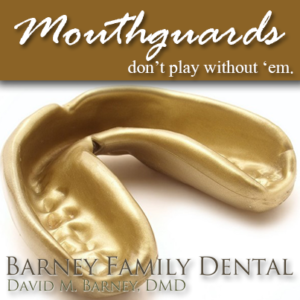Reminding you to protect your mouth this winter!
December 24th, 2013
 With winter sports under way for a lot of our patients, Dr. Barney thought it would be a good time to remind our young athletes how important mouthguards are while participating in contact sports (and non-contact sports) this winter.
With winter sports under way for a lot of our patients, Dr. Barney thought it would be a good time to remind our young athletes how important mouthguards are while participating in contact sports (and non-contact sports) this winter.
Whether you wear braces or not, protecting your smile while playing sports is essential. Injuries to the mouth and jaw are some of the most common injuries received by athletes. Mouthguards help protect your teeth and gums. If you participate in basketball, boxing, hockey, football, gymnastics, lacrosse, martial arts, racquetball, rugby, track and field, skateboarding, skiing and snowboarding, skydiving, soccer, surfing, volleyball, water polo, weightlifting or wrestling, it is recommended by the American Dental Association that you wear a mouthguard.
Types of Mouthguards
Choosing the right mouthguard is important. There are three basic types of mouthguards: the pre-made mouthguard, the "boil-and-bite" fitted mouthguard, and a custom-made mouthguard. When you choose a mouthguard, be sure to pick one that is tear-resistant, well fitted for your mouth and easy to keep clean. Also make sure it does not prevent you from breathing properly during use. If you wear braces or a retainer, it is imperative for you to wear a mouthguard. Dr. Barney can show you how to wear a mouthguard properly and how to choose the right mouthguard to protect your smile. Further, many insurance coverages will cover a portion of the cost of mouthguards, and our team will always make sure you understand your benefits and coverage!
Taking Care of Your Mouthguard
Similar to a retainer, braces, or any other special dental appliance, it is important to take care of your mouthguard by storing it properly and keeping it clean. You should also know when to replace your old mouthguard with a new one. Here are a few simple ways to keep your mouthguard clean and working correctly:
• Gently scrub your mouthguard after each use with a toothbrush and toothpaste.
• Store your mouthguard in a protective case.
• Do not leave your mouthguard in the sun or in hot water; it may melt or become deformed.
• Replace your mouthguard at the beginning of every new sports season. You should also replace your mouthguard if you notice it has become worn and no longer fits properly.
• Do not wear a retainer with your mouthguard. If you wear braces, your dentist will help design a mouthguard to protect your teeth and your braces.
• Do not chew on or cut pieces off of your mouthguard.
• Bring your mouthguard to each dental checkup, and your dentist can check to make sure it's still in good shape.
Our goal is to help minimize your chances of a sports related injury. Be sure to ask your dentist about mouthguards at your next dental checkup!
We hope this helps you remember to always wear a mouth guard and other forms of protective gear when participating in winter sports! We encourage you to give us a call if you have any questions or ask us on Facebook!
For more information about the importance of mouthguards and facial protection, our staff at Barney Family Dental encourage you to head over to the American Dental Association's website to read a great article on the importance of mouth guards and facial protection.




 Website Powered by Sesame 24-7™
Website Powered by Sesame 24-7™